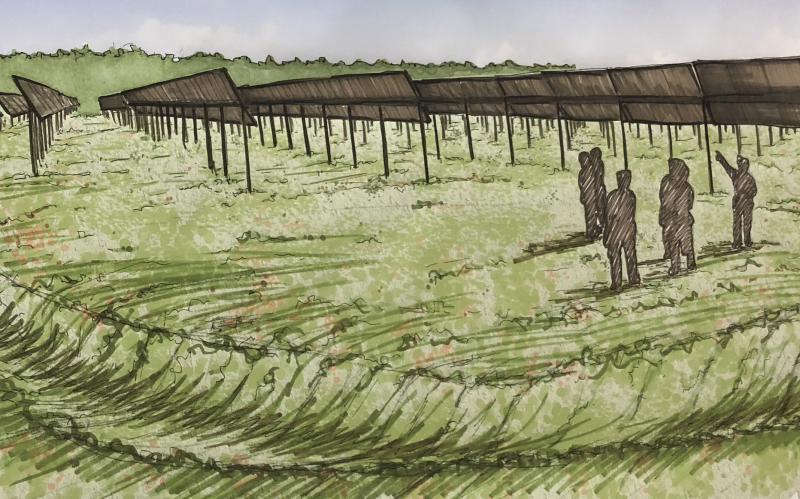Planning Board votes against solar farms for cranberry bog owners
A pitch to let struggling cranberry farmers build solar farms over their crops might not have a bright future in Dartmouth, as town officials have uncovered legal, ethical, and policy concerns with a proposed Fall Town Meeting article to establish the program.
The Planning Board voted unanimously in the negative when asked if it would recommend its passage at the Fall Town Meeting. It is being pitched by Fred Bottomley, who owns Farland Farms and a cranberry bog on Flag Swamp Road.
Bottomley, working with NextSun Energy, is proposing to allow cranberry farmers to build large solar farms over their cranberry bogs to take advantage of a new state program, called the Solar Massachusetts Renewable Target (SMART) program. It encourages the expansion of solar production in the state on suitable agricultural land.
The program would be limited to agricultural land taxed under agricultural status, and only physical cranberry bogs which have been in operation for the past five years. Under these conditions, Bottomley’s 30-acre bog, and several others would be eligible for a total of 115 acres of potential solar land.
At this time, NextSun officials said they are only working with Bottomley, and the other owners have not expressed an interest in participating in the program.
At a Planning Board meeting on August 20, Marc Deshaies, local counsel for NextSun Energy, said the solar panels are larger than usual to allow for harvesting to continue. He said the intent is to create a “dual use,” allowing cranberry farmers to keep their businesses, while also harvesting electricity. The panels are designed to maximize sun exposure by moving with the sun.
The panels would block sunlight to some of the crops, but studies into the project carried out by UMass Amherst shows in some conditions, cranberries fare well in such conditions depending on the weather during the growing season.
Michael Wainio, who manages the property, explained the proposal could be a lifesaver for the region's struggling cranberry farmers, many of whom are making less than the cost of production. He said in the late 1990s, growers were getting $80-$85 per 100-pound barrel. But the industry went into oversupply in the 2000s, dropping to $4 a barrel.
“You can imagine the distraught we went through here,” Wainio said. “We ended up getting federal subsidiaries that year, which saved half the industry from going out of business.”
Combined with increasing competition from Canada, Wainio said the industry never truly recovered. Small operations survived with family farmers picking up day jobs, but mid-range operations continue to suffer. He said 2008 was the last year he did well in the business.
A public hearing into the proposal was continued until September 10 to give the board and the town’s legal counsel time to analyze the proposal. In his legal analysis, town attorney Brian Cruise uncovered several complications with the bylaw.
Cruise noted the petition only allows the solar farms for a specific subset of the town's agricultural properties, which, while not a legal issue, could present policy issues if other farmers were interested in the idea.
He also raised legal concerns, including issues with the eligibility criteria, which may change over time, would require the town to be at the mercy of the state to ensure compliance with the law, and the law could allow only farms which "qualify" for the program but have not obtained state approval to build.
At the September 10 meeting, attorney Richard Serkey said the Planning Board had been given an updated amendment to the bylaw addressing the legal questions, including requiring bogs to obtain and retain approval, remain compliant with the state law even if it’s changed later, and grant the town’s Director of Inspectional Services the authority to make sure approved bogs are in compliance with the state program.
Cruise said the update did solve most of his strictly legal issues, but concerns remain about whether or not the town and its Director of Inspectional Services would have the legal authority to decide if a town property is in compliance with a state-level program.
“That I don’t think is a fixable issue, quote-unquote,” he said. “I think that’s inherent to the sort of way they want to have the bylaw drafted.”
Cruise also questioned the approach NextSun was using to make changes to its proposal, noting under the town charter, the Planning Board could only give its recommendation based off of the original petition as submitted, not the changes and amendments that had been made since then.
The Planning Board was also surprised to learn that Bottomley intended to sell his property to NextSun — a fact that members noted had not been disclosed at the public hearings, and was only brought up by board member John Sousa after he read it in the news.
The idea did not sit well with the Planning Board, who viewed the sale as risking making the project solar first, farmers second — a notion NextSun officials strongly rebuked.
“You’re skirting the law because the law is made to help our farmers,” said member Lorri-Ann Miller. “The laws are not made to help you.”
The board unanimously voted to not recommend the article’s passage at Town Meeting. After the meeting, Serkey said they are not yet sure how they are going to proceed.
The Fall Town Meeting is scheduled for October 16.












